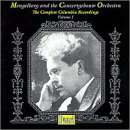| All Artists: Willem Mengelberg, Concetgebouw Orchestra Title: Columbia Recordings 1 Members Wishing: 0 Total Copies: 0 Label: Pearl Release Date: 11/15/1993 Genre: Classical Styles: Opera & Classical Vocal, Forms & Genres, Suites, Theatrical, Incidental & Program Music, Historical Periods, Classical (c.1770-1830), Modern, 20th, & 21st Century, Symphonies Number of Discs: 3 SwapaCD Credits: 3 UPC: 727031901822 |
Search - Willem Mengelberg, Concetgebouw Orchestra :: Columbia Recordings 1
 | Willem Mengelberg, Concetgebouw Orchestra Columbia Recordings 1 Genre: Classical
|
Larger Image |
CD Details |
CD ReviewsWins My Prize for Best Historical Reissue. John Austin | Kangaroo Ground, Australia | 08/22/2000 (5 out of 5 stars) "To this and its companion volume, I would award the first prize in any historical reissue competition. To begin with, the music making remains perennially exciting. Then, the accompanying notes by Robert Cowan are models of their kind, offering broad general assessments of Mengelberg as a conductor and detailed pointers to these recordings in particular. The third virtue is especially gratifying to one who has had his hands on heavy original 78s and later LP issues of some or all of these items - the transfers by Mark Obert-Thorn are outstandingly good. Gone is surface noise. Gone are uncertainties about playing speeds and speed fluctuations. Unblemished pressings have been used. Older music lovers may know that these early electric Columbia records (which used to bear the caption "Willem Mengelberg and His Concertgebouw Orchestra) offered wonderfully full and vivid sound for their time. Details of balance, and the overall warm acoustic of the Amsterdam Concertgebouw are made even clearer in these excellent transfers. So clear is the focus, in the Bach Suite, that it is now possible to be certain that an old rumour is true, namely that Mengelberg used not one but five flutes for this work." Excellent sound for its time ; mostly fine Mengelberg Jeffrey Lee | Asheville area, NC USA | 07/15/2004 (4 out of 5 stars) "Considering all of the selections from this three disc Pearl set originally were recorded from 1926 to 1932 on Columbia 78s, the overall sound quality is really very good, thanks largely to the efforts of the already well appreciated Mark Obert-Thorn. There is a fairly good cross section of the kind of music typically associated with the legendary conductor of the Amsterdam Concertgebouw Orchestra for a half century (1895-1945), Willem Mengelberg, whose style I've personally had some mixed feelings about. On the positive side, I enjoy most of all the lyricism, often associated with portamentos, he elicits from the Concertgebouw strings. Also, at times, I consider him one of the most exciting of all conductors. However, there are moments when I do not appreciate some of his tempo accelerations or decelerations. Of course, that's what partially makes Mengelberg Mengelberg. Notwithstanding, despite more stylish versions (e.g. Leppard) I find Mengelberg's Second J.S. Bach Suite quite enjoyable. It blooms with a pleasantly flowing, consistently musical quality. Ditto the J.C. Bach Sinfonia No. 2. The little known (to me) Anacreon Overture by Cherubini seems to be well presented. As for the Beethoven offerings, the second movement [only] from his Eighth Symphony is rather beguiling and the Turkish March from the Ruins of Athens and the Leonore No. 1, Coriolan and Egmont Overtures are all given thrusting and musical renditions. Only the reading of the Leonore No. 3 is slightly disappointing to me. In Weber's Overtures to Der Freischutz, Euryanthe and Oberon that wonderful sense of Mengelbergian ardor shines through. The finales are especially invigorating. With the Oberon, I was reminded of Teldec's video, Legendary Conductors of a Golden Era, where Mengelberg is seen conducting the work at a special locale near Paris. That performance is even more excitingly conducted than this one. The cut scherzo from Mendelssohn's Midsummer Night's Dream is probably the only weak representation of the set. The playing is not up to snuff. There are two short pieces from Berlioz's Damnation of Faust---Dance of the Sylphs, which shines with an almost unearthly attractiveness, and the Hungarian March, which though given an okay run through, also does not quite measure up to the conductor's same offering on the aforementioned Teldec video. The Liszt Les Preludes, however, is a horse of a different color---about the most outstanding presentation I've ever heard. Both of the Wagner selections---Prelude to Act One of Lohengrin and the Tannhauser Overture (Dresden version) are also of a high order. The "weeping" string portamentos in Lohengrin are marvelous, though I wish the sound engineers (if it had been possible with then existing technology)would have permitted the climax to resound more openly. Finally, the third movement [only] of the Brahms First Symphony displays some unorthodox tempo shifts, which I don't mind. However, I'm not crazy about the interpretation of the Academic Festival Overture. The wonderful Third Symphony is presented in its entirety with the unnecessary repeat taken in the first movement. Overall, this is a good performance but I don't consider it a distinctive one. I certainly can do without Mengelberg's tendency to race the pace in some of the more sensitive portions of the andante and the poco allegretto, though there are moments where the Concertgebouw strings sing rather nicely. Elsewhere, the closing portions of the last movement are very well done. Though discontinued, this generally satisfying Mengelberg set may be worth your while to search for. Check vendors who sell through Amazon."
|

 Track Listings (15) - Disc #1
Track Listings (15) - Disc #1